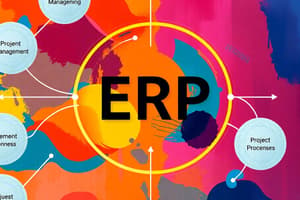Podcast
Questions and Answers
What is essential for the ERP integration process?
What is essential for the ERP integration process?
- It must remain independent of the existing information system.
- It must align with the existing information system. (correct)
- It should replace the existing information system completely.
- It is optional to consider the existing information system.
What should the parameterization and testing of the ERP system be based on?
What should the parameterization and testing of the ERP system be based on?
- The preferences of the software vendor.
- General industry standards.
- The company's defined activities and processes. (correct)
- Random selections to check functionality.
What is the primary focus of the audit in the project implementation phase?
What is the primary focus of the audit in the project implementation phase?
- Evaluating the company's marketing strategies
- Assessing employee satisfaction
- Determining the budget for the project
- Reviewing the company’s practices (correct)
What is a necessary step before putting an ERP system into production?
What is a necessary step before putting an ERP system into production?
How should training sessions for an ERP system be structured?
How should training sessions for an ERP system be structured?
What is essential for the successful realization of an ERP project?
What is essential for the successful realization of an ERP project?
What is the outcome of the requirements gathering phase in ERP project implementation?
What is the outcome of the requirements gathering phase in ERP project implementation?
What is the role of user feedback in the parameterization process?
What is the role of user feedback in the parameterization process?
What purpose does the ERP system serve regarding reference data?
What purpose does the ERP system serve regarding reference data?
During the ERP project implementation, what factor is crucial when selecting a solution?
During the ERP project implementation, what factor is crucial when selecting a solution?
How does a dedicated team contribute to ERP project implementation?
How does a dedicated team contribute to ERP project implementation?
What happens to new features and updates after ERP training sessions?
What happens to new features and updates after ERP training sessions?
What is the critical aspect of selecting ERP software?
What is the critical aspect of selecting ERP software?
Linking project stakes to the company's growth policy is primarily done during which phase?
Linking project stakes to the company's growth policy is primarily done during which phase?
What is typically assessed during the audit phase of project implementation?
What is typically assessed during the audit phase of project implementation?
What is a characteristic of a dedicated team for an ERP project?
What is a characteristic of a dedicated team for an ERP project?
What is the main difference between ERP on premise and ERP Cloud?
What is the main difference between ERP on premise and ERP Cloud?
What is involved in the parameterization of an ERP system?
What is involved in the parameterization of an ERP system?
Which of the following is NOT a function of ERP systems according to the content provided?
Which of the following is NOT a function of ERP systems according to the content provided?
What is meant by ‘evolutivity’ in the context of ERP systems?
What is meant by ‘evolutivity’ in the context of ERP systems?
What defines ‘interoperability’ in relation to ERP systems?
What defines ‘interoperability’ in relation to ERP systems?
Which of these statements about benchmarking in ERP implementation is accurate?
Which of these statements about benchmarking in ERP implementation is accurate?
What is a key feature of the software installation process in ERP?
What is a key feature of the software installation process in ERP?
Which aspect is associated with the KPI in an ERP system?
Which aspect is associated with the KPI in an ERP system?
Which benefit is most associated with using ERP Cloud solutions?
Which benefit is most associated with using ERP Cloud solutions?
What does the implementation of specifications defined during the needs audit involve?
What does the implementation of specifications defined during the needs audit involve?
Flashcards
ERP Implementation
ERP Implementation
The process of putting the chosen ERP software into operation, involving integration, parameterization, testing, training, and maintenance.
ERP Audit
ERP Audit
A thorough examination of a company's current practices and procedures, covering key areas like process flows, inventory management, and sales.
ERP Integration
ERP Integration
The ERP software must be compatible with the existing IT systems of the company.
Dedicated ERP Implementation Team
Dedicated ERP Implementation Team
Signup and view all the flashcards
Collecting ERP Requirements
Collecting ERP Requirements
Signup and view all the flashcards
Infrastructure Update
Infrastructure Update
Signup and view all the flashcards
Data Migration
Data Migration
Signup and view all the flashcards
ERP Solution Selection
ERP Solution Selection
Signup and view all the flashcards
ERP Implementation Planning
ERP Implementation Planning
Signup and view all the flashcards
ERP Parameterization
ERP Parameterization
Signup and view all the flashcards
Company Overview
Company Overview
Signup and view all the flashcards
ERP Testing
ERP Testing
Signup and view all the flashcards
Identifying Company Growth Opportunities
Identifying Company Growth Opportunities
Signup and view all the flashcards
ERP Training
ERP Training
Signup and view all the flashcards
Company's Strategic Objectives
Company's Strategic Objectives
Signup and view all the flashcards
ERP Maintenance
ERP Maintenance
Signup and view all the flashcards
Management Data
Management Data
Signup and view all the flashcards
On-Premise ERP
On-Premise ERP
Signup and view all the flashcards
ERP Cloud
ERP Cloud
Signup and view all the flashcards
Parameterization
Parameterization
Signup and view all the flashcards
Business Document Template Customization
Business Document Template Customization
Signup and view all the flashcards
ERP Benchmarking
ERP Benchmarking
Signup and view all the flashcards
ERP Evolutivity
ERP Evolutivity
Signup and view all the flashcards
ERP Interoperability
ERP Interoperability
Signup and view all the flashcards
ERP KPIs
ERP KPIs
Signup and view all the flashcards
Study Notes
Course Information
- Module: SI202E – Information Systems (SAP)
- Hourly volume: 24 hours
- Academic year: 2024-2025
- Professor: Dr. Amine Senoun
Chapter 2: ERP Project Management
Plan
- Introduction
- Project implementation
- Technological choices
- Conclusion
ERP System Components
- Accounting and Financial Management
- Warehouse Management
- Inventory Management
- Manufacturing and Logistics Management
- Supply Chain Management
- Customer Relationship Management
- Human Resources
- Business Intelligence
Project Implementation
- Audit: Provides an overview of the company's practices (flow, processes, inventory management, sales, etc.)
- Dedicated Team: Crucial for 100% project dedication, managed by a project manager responsible for ERP implementation
- Collecting Requirements: Linking project goals with company growth policy; results in specifications
- Choosing the Solution: Selecting ERP software matching the specifications and desired features; many options exist
- Putting into Production: ERP integration aligned with the existing information system; updating infrastructure; migrating data into the central ERP database
- Parameterization and Testing: Adjusting settings to match company activities and processes; evaluating through testing and feedback from users
- Training and Maintenance: Training different departments to easily use new features; adding updates
Technological Choices
- Data Migration:
- Reference Data: Information about elements interacting with the company (customers, prospects, suppliers, etc.)
- Structure Data: Used to analyze and organize existing information from the old system
- Management Data: Essential information for the daily operation of the company
- ERP on Premise: ERP installed locally on company hardware; data stored on company servers
- ERP Cloud (SaaS): Software provided as a service; company's ERP software and its associated data centrally managed on the internet
- Parameterization:
- Software installation and activation of licenses and options
- Creating user accounts and configuring access rights
- Creating the SQL database
- Customizing document templates (quotes, invoices, etc.)
- Implementing the specifications from needs audit
- Implementing the interactions between application solutions (interfaces)
- Benchmarking: Comparing different ERP solutions (e.g., using a Gartner chart)
Conclusion
- KPIs (Key Performance Indicators):
- Reliability
- Evolutivity and interoperability
- New uses
- Cost and profitability
Bibliography
- Includes several academic works and online resources related to SAP R/3 and ERP implementation
Studying That Suits You
Use AI to generate personalized quizzes and flashcards to suit your learning preferences.




